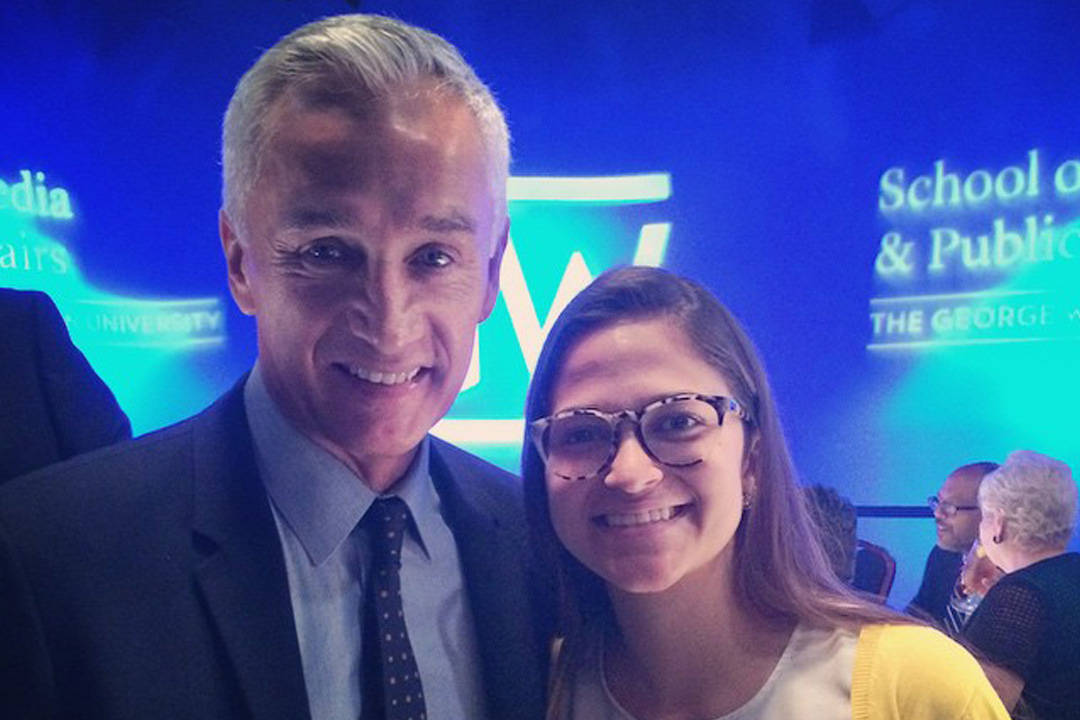This week, on Tuesday, September 22, 2015, I made my grandmother proud. Every Sunday, she and my mom watch Jorge Ramos host Al Punto on Univision. They trust him. He is their source of news like for many other U.S. Latinos.
This past Tuesday, Jorge Ramos addressed students, professors, and community advocates at GW and I couldn’t believe he was standing right in front of me. I didn’t know if I had to thank SMPA, D.C., or the Pope for that, but regardless it was definitely an #OnlyAtGW moment I’ll remember forever.
The event opened with the infamous clip of Ramos questioning Trump on his aggressive immigration policies with data supporting that it’s impossible to deport 11 million undocumented immigrants. After failed attempts to make Ramos sit down, Trump had Ramos escorted out of the press conference by a bodyguard—proving that what Ramos said was a statement all on its own. That Trump had a journalist escorted out of a press conference by force merely for asking a question exposed the authoritarian style of Donald Trump. This truth was important for people to acknowledge, Ramos explained.
An audience member questioned Ramos about the impact of the media spin around the clip that portrayed Ramos as disrespectfully interrupting Trump, asking if Ramos thought it reinforced Trump’s negative views of Latinos. Ramos calmly reiterated that Trump’s actions and his “Go back to Univision” response were telling of who Trump is as a candidate and that the Latino community was watching. “Latinos aren’t going to vote for anyone that says ‘I’m going to deport your mother, your father, and your friends,’” Ramos explained.
My favorite memories of the event were when Chef José Andrés came on stage to break down immigration reform into simple terms and when Ramos addressed the questions of whether he was an activist or a journalist.
Andres said that the Democratic agenda for immigration reform should be the republic’s agenda for immigration reform; that what immigrants truly want with citizenship is simply to do good and make something of themselves. He’s right. That’s why people come to this country. They don’t come here to break laws and be deported. He used the example of congressmen eating carrots that were picked by immigrants. “If you want to eat your carrots, that’s fine. But pay the person picking them the right amount,” said Andrés.
When an audience member asked if he thinks he’s an activist or a journalist, he graciously answered, “It’s our social responsibility to ask questions.” He explained it’s the duty of a good journalist to challenge people in power. That in order to question political figures, journalists must not be afraid to literally stand up and take a stance on something when questioning politicians to show balance of power.
I agree that the best examples of journalism have been when journalists question leaders and are forced to take a stance for those who cannot. Journalists, in a way, need to be vehicles for the voice of people who can’t directly access their political figures. Ramos emphasized that he wasn’t challenging Trump because of his personal views; he was challenging Trump because he was spreading a false narrative of the Latino community. Creating a premise out of data to refute and question Trump’s claims doesn’t make him an activist. That makes him a journalist doing his job.
In closing, Ramos gave us students one piece of advice. That was, “Don’t shut up, don’t sit down, and don’t get out.”
“The Dreamers are my heroes,” he said. They give him the strength to keep questioning institutions. Like them, he urged us to stay vigilant and do the same, to speak out when we don’t like something during times of injustice.
Thankfully, this is something that SMPA is able to instill in us by hosting and exposing us to leaders like Ramos himself.
Melissa is a Political Communication major and will graduate in the spring.


